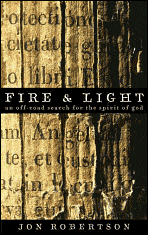
Jon Robertson’s off-road search for the Spirit of God is his attempt to reach an understanding of Spirit without the dogma and prejudices attached to conventional religious dogmas. Throughout his book, he interviewed the religious, the spiritual, the irreverent and the everyday fold who say they’ve had experiences of “Spirit” in their lives. In addition to interviews, Robertson takes a tour of scriptures to attempt a timeline of when Spirit was most active in people’s lives.
His search for Spirit seeks to answer questions like “how does Spirit operate in people?”, “Does everyone have access to it?” and deeper questions such as “Does the Spirit only come to us from outside or dies it also operate inside us?” “Why don’t we experience Spirit whenever we want?”.
The answer is actually given in the author’s preface “…the Spirit seeks that which is like itself.” But don’t let this stop you from reading this interesting, witty and sometimes slightly irreverent book.
The author draws on many traditions to find answers, including Native American spirituality, Judaism, Islam and Hinduism. But I found the main focus to be on or from Christianity, perhaps because Christianity has had the most contentious relationship with “Holy Spirit.”
Robertson takes his readers on a romp through recorded religious history and examines the political landscape around such heavy-hitters as Paul of Taursus, St. Augustine and a pantheon of popes and prelates. This work is an ambitious undertaking but I was pleasantly surprised to find it both very readable and very reasonable.
The Catholic Church has exercised a death-grip on “Holy Spirit”, disallowing individual experience of the Divine, in order to further its political and religious agenda – actually, one in the same. Robertson points out that the initial experience of the followers of Jesus was exactly that of direct experience “gnosis.” Throughout history, as people have been barred from access to Spirit through their prelates and dogma, renegade heretics have sprung up, (“reformation”) and revitalize people’s spiritual lives. This has happened over the centuries and continues to today.
Few of the interviewees in this book have had the level of experience of say, the Angel Gabriel visiting Mary in Bethlehem. However, there stories reveal an ongoing affair between Spirit and mankind. Perhaps not as profound, but still life changing and notable. Robertson concludes, “Direct experiences with the Divine seem to vary in depth, intensity and duration. It’s as though the individual capacity for spiritual experience play a role in the degree of the Spirit’s effect.”
In other words, like attracts like. The more you are in tune with divine love, the greater the chances of having direct experience of divine love.
I highly recommend this book, especially if you enjoy a witty and intelligent read. Mr. Robertson’s writing style took what could be a very dry and scholarly topic and made it accessible for today’s readers, and a page turner. “The Church soon began to regulate the unauthorized downloading of the Holy Spirit…” As someone who grew up Catholic with a Catholic education, I could readily appreciate the roots of dogma Mr. Robertson gives his readers. He takes it one step further, though, by placing his commentary within the context of historical fact and cultural mores. I hope to see more of Mr. Robertson’s work.
review by Karen Phillippi
Author: Jon Robertson
Celestial Arts, 2006
pp.286, $15.95
